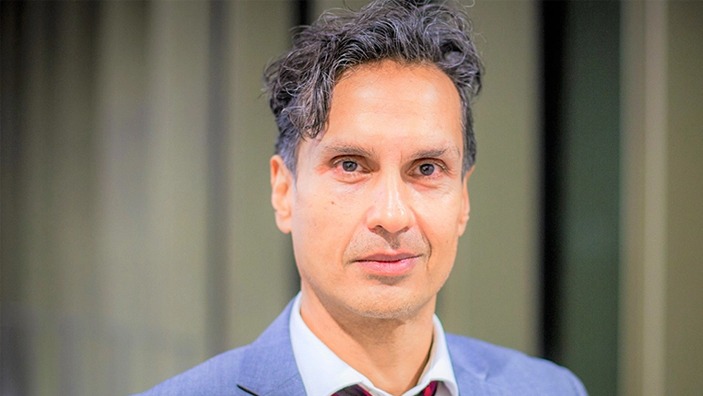There is perhaps nothing more pressing than tackling some of the ‘grand challenges’ of our era, including climate change, healthcare and inequality. These challenges are the focus of governments, NGOs, companies and citizens across the globe – and, increasingly, the topic of academic papers and other scholarly examinations.
Strength and weaknesses of the theories

What are the strengths and weaknesses of each theory? And how can these 3 approaches best intersect and interact to help find the best avenues to address the issues of our age?
Those are the topics of a paper – entitled “Strategizing together for a better world: institutional, paradox and practice theories in conversation” – published in the Journal of Management Inquiry. The paper is based on a moderated symposium at an Academy of Management meeting that included Shahzad Ansari, Professor of Strategy & Organisation at Cambridge Judge Business School, who was joined in the discussion by Natalie Slawinski of Gustavson School of Business at the University of Victoria in Canada and Eero Vaara of Saïd Business School at Oxford University.
The article says that the 3 scholars selected for the symposium have been “particularly influential in shaping how we conduct research on grand challenges using institutional, practice, and paradox theory in our field”. The symposium moderator was Ann Langley of HEC Montreal, co-editor of the journal Strategic Organization and an editorial review board member of the Academy of Management Journal.
The symposium drew from a paper published in the Academy of Management Journal by Barbara Gray of Smeal College of Business at Pennsylvania State University, entitled “Call for activist scholarship in organizational theorizing”, which said that scholars “must confront the pain that comes from ignoring our interdependence and reframe our attention to our collective plight”.
While there are other theories used to address grand challenges, institutional, paradox and practices theories (lenses) were selected by the organisers (Rikke Rønholt Albertsen of Copenhagen Business School, Katrin Heucher of the University of Groningen, Marc Krautzberger of the University of Edinburgh Business School and Pauline Reinecke of the Hamburg University of Technology) for the symposium because “these lenses are particularly present in interdisciplinary debates in current research, and we were convinced that this would appeal to a broad audience of established as well as young scholars who will be inspired by our panel”, says the article in Journal of Management Inquiry.
The 3 theories
1. Institutional theories (reflecting social order)
This theory looks at historical patterns of rules, assumptions, practices, and beliefs through which people (as a previous study phrased it) “produce and reproduce their material subsistence, organise time and space, and provide meaning to their social reality”. Institutional theory thus provides a good base to reflect on such taken-for-granted concepts to examine how they are being challenged by something like climate change. Examining these conceptions of yesterday can help scholars wrangle with the complexities of developing strategies to deal with the grand challenges of today.
2. Paradox theories (reflecting tensions)
Paradoxes, which are often defined as “persistent contradictions between interdependent elements”, allow scholars to focus on tensions – and climate change is a good example as there are contradictions between moving quickly to carbon-free energy and the economic and social disruption this will cause.
3. Practice theories (reflecting collective action)
This allows scholars to take a more granular view on how patterns of action are reproduced through concrete practices or language, thus allowing researchers to develop a better understanding of how strategic responses to grand challenges are enacted.
Thoughts on practice, paradox and institutional theories
The symposium included statements by the 3 panellists followed by moderated remarks and their answers to audience questions. Here are some edited excerpts of the remarks by the 3 panellists and quotes from the debate, supplemented by later comments from Shahzad in an interview:
Eero Vaara on practice theory
1
A lot can be gained by analysing shared narratives
A lot can be gained by going further with analysis of the narratives we share and spread. Dialogue is the key word, and there’s also a lot of research on dialogue in other areas that we haven’t been tapping into. Nowadays a lot of this is happening in the environment of social media and relatively new technologies that are developed all the time.
2
Use attention-based perspectives to understand organisations
We should apply attention-based perspectives to understand what’s going on inside particular organisations and to look at attention across organisations. Emerging concepts such as strategising networks could be helpful precisely in order to understand how we can together make the world a better place.
3
Open strategy has emerged as an exciting new topic area
Open strategy is defined as “dynamic bundle of practices that affords internal and external actors’ greater strategic transparency and/or inclusion” – and this can help deal with questions that go beyond particular companies or organisations, to broaden the scope.
4
Practice-based perspectives can and should be combined with institutional analysis
Connecting a detailed analysis of practices with broader issues of institutional change would help us a great deal to better understand the processes and mechanisms of change, and to comprehend how particular practices impede change. Paradoxical tensions are also very closely related to a practice-based angle when analysing tensions and struggles and how to deal with them.
Connecting a detailed analysis of practices with broader issues of institutional change would help us a great deal to better understand the processes and mechanisms of change, and to comprehend how particular practices, especially practices of decision-making and strategizing enable or impede change. Finally, paradoxical tensions are also very closely related to a practice-based angle when analysing tensions and struggles and how to deal with them.
Natalie Slawinski on paradox theory
1
Consider the impact of UN sustainable development goals
We are all familiar with the sustainable development goals (SDGs) which were launched by the United Nations in 2015. But we don’t know what the consequences are even if we do act on them, and we don’t know how our actions to address them will unfold.
2
Solutions create new problems
These problems are wicked. When we find solutions often those solutions cause new problems. For example, with climate change, we install wind turbines to reduce our carbon emissions, and those kill birds and create health problems. So these are not easy issues to tackle, and they’re rife with tensions.
3
A common reaction to paradoxes is defensiveness
A common reaction people may have to paradoxes is to feel defensive about them. When we bring opposites together and try to pull them together, it may be uncomfortable, and as a result, people, organisations, or institutions may ignore them or treat them as an either-or choice. However, paradox theory argues that when we pull these poles together, when we juxtapose opposites and engage with, and work through paradoxes, we can get to more sustainable solutions.
If it weren't for this session, I don't know if I would have dug so deeply into how to combine these different theories. And now I'm seeing all kinds of possibilities in my own research for how to bring in more of a practice and/or institutional lens together with paradox theory.
Shahzad Ansari on institutional theory
1
Institutional theory is useful when studying climate change
Institutional theory is a useful foil to study climate change. It enables us to study the conflicting institutional demands from different stakeholders that generate conflicting logics, so institutional theory helps us reconcile divergent perspectives among dissenting actors – rather than labelling shared responsibilities as someone else’s problem or by finger pointing at culpable others.
2
Shifting positions help us understand institutional theory and climate change
The Kyoto Protocol and how different people shifted their radically different positions helps us understand the ‘commons logic’ element of institutional theory as it relates to climate change. Greenpeace used to hate market mechanisms, but they came around to agreeing to carbon trading because they felt that ‘the train has left the station’ and that they needed to be on it to remain relevant in addressing climate change.
3
Gaming of carbon trading is a major market mechanism
It’s interesting that emissions trading started at one company, British Petroleum (BP) and then got diffused to the EU level, and even globally. We call this ’catalytic amplification’ – and while there still controversies around the ‘gaming’ of carbon trading, it has become a major market mechanism.
4
There are 3 criteria for commons logic in institutional theory
We identified 3 criteria of a commons logic as it relates to institutional theory. Key stakeholders need to view an issue as a collective problem in which their fates are interconnected; they need to acknowledge the issue’s complexity rather than blame others; and they need to reach a common position on a collective remedy, no matter how difficult that may prove. During the pandemic, for example, many people came to realise that they are not safe until everyone is safe, underlining our interdependence.
5
The concept of ‘commons action’ applies to various sectors including finance
The idea of a ‘commons action’, or lack of it, also applies to other sectors such as the financial sector. A really interesting paper some years ago addressed why it’s so difficult to tackle tax avoidance and the black market, and this because there is not a commons logic in global finance.
6
Weaknesses in institutional theory: minimal focus on materiality over symbolic significance
There are some weaknesses in institutional theory, including the scant attention accorded to materiality at the expense of illuminating the symbolic. Actor-network theory (ANT), which focuses on shifting relationships, does a better job at this because it brings a broader understanding of an actor as someone or something who acts, attributes or is attributed agency by others. From an ANT perspective, grand challenges could more fruitfully be studied as a social praxis entangled in material formations of humans (eg key stakeholders) and non-humans (eg the atmosphere). A forthcoming paper takes an interesting look at how our understanding in this area is shaped not just by history and tradition, but also how things smell, the space, the place, and broader feelings from an experience.
Barbara Gray was mentioning […] that we have to think beyond the self and get to ‘we-thinking’ which is a commons approach … We believe that this idea of a commons logic, how it emerges, gains traction, picks up momentum, and diffuses in different ways is an exciting area for both research and practice to collectively tackle the grand challenges that we confront.
Working together to solve the world’s problems
In a blog post written about the new article, the symposium organisers focus on the need to work together – not in silos – in tackling the world’s most complex problems. As one peer-reviewer said of the new paper: “I would assign this paper to any first year PhD student in Management and/or Sociology”, the blog says.
Featured research
Albertsen, R.R., Ansari, S., Heucher, K., Krautzberger, M., Langley, A., Reinecke, P.C., Slawinski, N. and Vaara, E. (2023) “Strategizing together for a better world: institutional, paradox and practice theories in conversation”Journal of Management Inquiry





